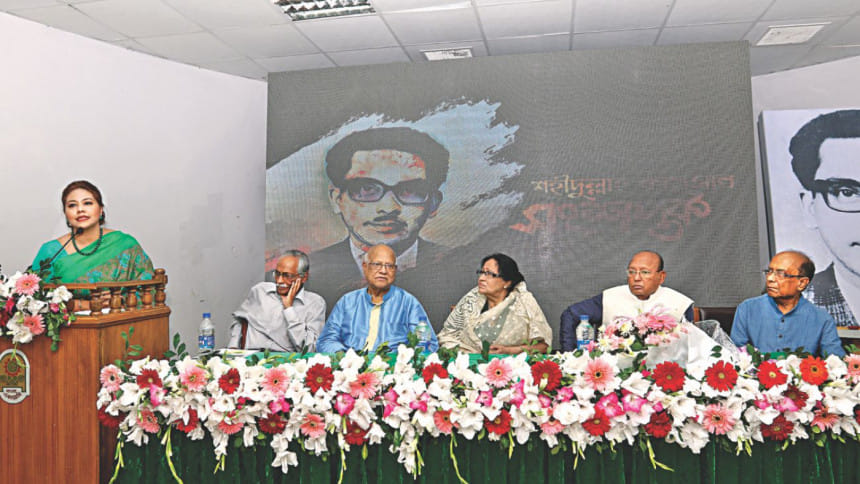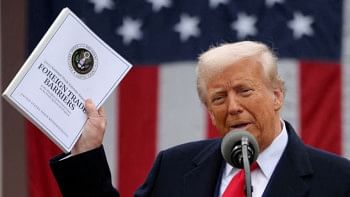A daughter's quest to discover her father

On a cold mid-December night in 1971, just as the people of Bangladesh began to sense an end to nine months of bloodshed to find a national identity of their own, one of the most heinous conspiracies was carried out by collaborators of the Pakistani occupation forces. The brightest minds of the land were all picked up and brutally murdered, in a desperate attempt to intellectually paralyse an emerging nation. And 45 years after that, a new generation has not had a great chance to learn about the luminaries who played a pivotal role in Bangladesh's independence, not just in the nine months of '71 but from long before.
Shomi Kaiser is an instantly-recognisable name to anyone who has followed Bangladesh's entertainment industry through the '90s, but she has another identity much bigger than that: she is the daughter of Shahidullah Kaiser, a powerhouse journalist-author-politician who was taken away on the night of December 14, 1971 by the Al-Badr forces. To discover her father's illustrious life and bring it to the people, Shomi set out on a difficult quest – of making a documentary. It took over 10 years, but Shomi Kaiser premiered the documentary, titled “Shahidullah Kaiser: Sangsaptak” on Friday at the Shamsur Rahman seminar hall of Bangla Academy.
Finance Minister AMA Muhith was the chief guest at the programme, while Commerce Minister Tofayel Ahmed was special guest. Other speakers included Liberation War Museum trustee Dr. Sarwar Ali and Bangla Academy's Director General Shamsuzzaman Khan. Shahidullah Kaiser's wife Panna Kaiser chaired the session. Among others, the programme was also addressed by writer-activist Shahriar Kabir, who is also a cousin of Shahidullah Kaiser; Shaheen reza Noor, Assistant Editor at The Daily ittefaq; Khandakar Moniruzzaman, acting editor of The Daily Sangbad, the newspaper where Kaiser's journalism career was most prominent -- and eminent journalist Toab Khan, advisory editor of The Daily Janakantha. They spoke of their memories of Shahidullah Kaiser, of his skills as a journalist and organiser, vision and leadership as a communist political leader and impeccable talent as a writer. The speakers raised the demand to the finance minister to consider allocating funds for making future documentaries on other martyred intellectuals so that the youth can get to know about them and their contributions.
Shomi Kaiser shared her arduous journey to discover her father through making the documentary. She began making the documentary over a decade ago, and promised herself she would not take anyone's financial assistance to do it. In an emotional speech, she also shared the experience of taking the interviews and going the places where her father grew up, and spoke about her future plans regarding the work, including making a second part of the documentary.
Tofayel Ahmed also shared his experiences and memories of the tumultuous days of the '50s and '60s where Shahidullah Kaiser was a central figure of the socialist political movement. Finance Minister AMA Muhith pledged to create the proposed fund so that more work can be done on the martyred intellectuals' lives and to ensure their contributions cannot be questioned.
Panna Kaiser, in a heartbreaking reminiscence of her brief family life with Shahidullah Kaiser, recalled the night her husband was taken away. She spoke of a last message he had given her, almost as if he could see the imminent danger ahead of him. She also spoke of the struggle she had to go through to bring up their two children with the ideologies of their father, as he had said in his last letter to her.
The documentary, shown at a curtailed runtime at the premiere, chronicles the life of Shahidullah Kaiser, from his birthplace to his youth days, political activism, imprisonment, his venture into writing in jail (where he wrote two timeless classics of Bangla literature, “Sareng Bou” and “Sangsaptak”), his work as a journalist at Ittefaq and Sangbad, and eventually his demise. Family members, contemporaries, colleagues and political associates of his share personal narratives of his life and works, interlaced with footage and pictures of his early life, and narration by Shomi Kaiser herself.

 For all latest news, follow The Daily Star's Google News channel.
For all latest news, follow The Daily Star's Google News channel. 



Comments